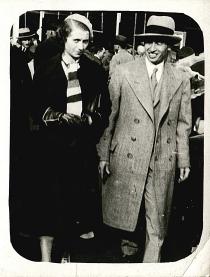This picture was taken in Nagymaros, my sisters-in-law were on their summer holiday there. This is Klari on the right, this is Iren, and this is me. At the front right, is Tibi, next to him is Endre and this little girl on the left is Ibi, so these are their children. I wasn't married yet at that time, I was engaged, so this must have been taken in 1929. They lived in a peasant cottage; they rented it and I stayed with them for a week.
They had holidays in all sorts of places, in Kiskunlachaza, at Lake Balaton. When they were on holiday in Balatonkenese, I visited them there too. I was pregnant at the time, with Judit, my daughter Marika was already around. They had two big wooden trunks, containing pots, bed sheets, everything and they moved there with the children for the whole summer. They probably mailed the trunks. Their husbands only went there for the weekends [during the week] they worked.
Iren's married name was Markne Rosner, and Klari's was Lajosne Weiner. Iren was born in 1901 and Klari in 1903.They also married quite early. They must have gotten married at around the same time, in 1921 or 1922, because in 1923, Ibi and Tibi were born in the same year. Before they were married, both of my sisters-in-law used to work in the offices of the former OTI, The National Social Security Institute. I think they finished four years of middle school. My sisters-in-law were not religious whatsoever. They only kept the fasts, but there was no lighting of candles or anything like that.
Klari didn't work; at that time, if women got married, they didn't work really. Her husband, as far as I remember, worked for General Biztosito (General Insurance.) Her husband was put on a B-list. He was made redundant. He got some severance pay. It was around 1938 or '39, so it might have been because he was a Jew. He had no income because he couldn't find another job. They couldn't pay the rent, so they moved to my husband's other sister's place for a while, and they brought the furniture to Matyasfold. Klari's son, Tibi, we don't even know where he ended up. He was taken away for forced labor. Klari was in the ghetto. And my children were with her in the ghetto. And after the war, Klari's work was mending stockings. At the end, she worked as a cashier in a pharmacy until her retirement. She died in 1973.
The Rosners had a shoe accessory shop in Baross Street. They also sold leather. This was a crummy, poky den. It was almost opposite their house. They had a two room flat, but the house itself wasn't very elegant. Just my brother-in law and Iren worked in the shop. Iren had a daughter, Ibi, and a son, Endre. Her son was born in 1927; I don't know what he did. Ibi worked in an office somewhere, but I don't know who for. She was deported from the KISOK field- she was buried in Germany. Somebody sent her (Iren) a picture of her grave. Her grave was taken care of for a while. Her son escaped from forced labor somewhere, and the Russians caught him and took him to Russia. We know nothing about him - where and when he died. Iren was in hiding with her husband. After the war, she worked in a food store, later she worked in an office for a long time, until she was about 90. She was 101 years old, when she died in 2002. In the retirement home, there was a big celebration on her 100th birthday. Both of my sisters-in -law were buried in the Jewish cemetery in a common grave


















































